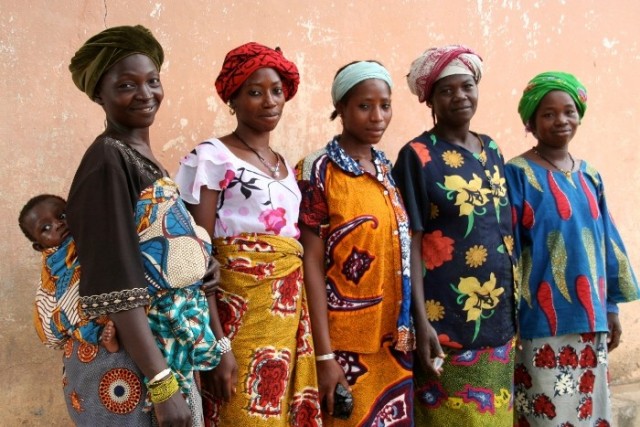Women in Africa
During the second half of the 1900s, the rise of women's movements around the world brought new attention to the role of women in Africa. Long overlooked by historians and scholars, African women have begun to gain recognition for their contributions to economic and political life as well as to the home and family. Still, African women generally do not receive the same education or employment opportunities as men, and in many cultures they are subordinate to men.

Role in Food Production
In the past many scholars regarded men as the principal players in African life. When forming theories about human origins, they focused on the importance of meat eating in human development—and meat eating depended on the male activity of hunting. The female activity of gathering plant food was thought to be of minor significance. Recent studies have shown, however, that gathered plant foods make up 60 to 80 percent of the diet of HUNTING AND GATHERING societies such as the !Kung of the KALAHARI DESERT in southwestern Africa and the Mbuti of the central African rain forest. The same was probably true of prehistoric hunting and gathering groups. These studies places the value of the work of female gatherers in a new light.
Few African societies now live by hunting and gathering, but African women play a central role in agriculture, the continent's main economic activity. Between 60 and 80 percent of all agricultural workers are women. Their work, however, has been undercounted and undervalued in official surveys because such surveys rarely include their unpaid labor on family land under the heading of “economic activity.”
Social, Economic, and Political Roles
In some traditional African cultures, particularly those organized in patrilineal and patriarchal ways, women had less power, status, and independence than men. This inequality deepened during the colonial era. Colonial administrators' views of family and society were based on a male-centered European Christian model. The laws and economic arrangements that they created in their African colonies imitated those models. Men, for example, were almost always regarded as the heads of households. As a cash economy developed in the colonies, men became the primary controllers of cash crops, jobs, and money.
Because both traditional and colonial systems often favored men, African men usually received an education, became literate, and enjoyed employment opportunities earlier than African women did. However, women as well as men have taken part in the movement that has swelled the population of Africa's cities and towns. Beginning in the late 1900s, harsh economic conditions for rural women, together with a growing desire for personal independence, led some young women to move from their villages to the cities. Today women outnumber men in all major African cities except LAGOS, NIGERIA, which is a large industrial port.
The opportunities available to women in African cities often depend on their level of education. Women without education find it hard to get jobs that pay wages and often join the informal labor market, performing tasks that require little training. Many of these women are market traders, bargaining for goods and then reselling them in open-air markets. In western Africa in particular, women dominate the market economy. Other urban women work as domestic servants, makers and sellers of beer, and prostitutes. Since the mid-1900s educated African women have enjoyed more professional opportunities in areas such as teaching and nursing.
Women's political roles are also expanding. In some colonies women made key contributions to the independence movements and the wars of national liberation of the 1960s. By the end of the 1900s, women had begun to appear in some high-level government positions. MALI, for example, had two women government ministers and a woman ambassador in the 1990s.
Education
Unequal education remains a barrier to the full participation of African women in government and economy. In sub-Saharan Africa, the problem is one of quality. Boys and girls are often educated separately, and girls' schools are not as good as boys' schools. Threequarters of women cannot read or write, and only between one-quarter and one-third of all girls attend school, compared with more than half of all boys.
The situation is similar in the Islamic nations of North Africa. Fewer girls receive an education than boys. Women in these countries live with the fact that Islam is often interpreted in patriarchal ways that limit opportunities and privileges for women. However, more and more North African women are learning to read, especially in freer, more modern countries such as EGYPT and MOROCCO. Some go on to study Islamic and state law, often interpreting religious and civil laws in ways that favor women's rights. In recent years some of Africa's Islamic nations have passed laws improving the status and rights of women, including raising the minimum age for marriage, granting women greater rights in cases of divorce, and limiting polygamy systems. (See also Family, Gender Roles and Sexuality, Kinship, Marriage, Queens and Queen Mothers.)